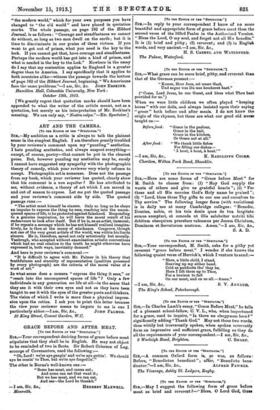ART AND THE CAMERA.
[To THY EDITOR or THE "SPECTATOR. 1
SIR,—My ambition as a critic is always to talk the plainest sense in the simplest English. I am therefore greatly troubled by your reviewer's comment upon my "puzzling" aesthetics. I hate puzzling aesthetics, and always suspect everything— except, of course, poetry—that cannot be put in the clearest prose. But, however puzzling my aesthetics may be, surely I cannot have suggested any sympathy with the photographic theory of comedy, which your reviewer very wisely refuses to
accept. Photographic art is nonsense. Does not the passage from my book, which your reviewer has quoted, clearly show that his comment is a non sequitur ? He has attributed to me, without evidence, a theory of art which I am moved in
and out of season to expose. Let me put the quoted passage and your reviewer's comment side by side. The quoted passage runs :—
" The artist must himself be sincere. Only so long as he obeys an impulse to express the thing he sees, reaching into the uncon- quered spaces of life, is he protected against falsehood. Responding to a genuine inspiration, he will leave the moral result of his endeavours to look after itself. But if he is, as an artiZt, Immoral; if he repeats a message which he has not himself realized imagina- tively, he is then at the mercy of mischance. Congreve, though not one of the very great artists of the world, was within his limits sincere. He is, therefore, saved not only artistically but morally. Vanbrugb, who accepted without examination artistic conventions which had no real relation to the truth he might otherwise have expressed is, both ways, inevitably damned."
And here is your reviewer's comment :—
"It is difficult to agree with Mr. Palmer in his theory that truthfulness and sincerity of representation (qualities possessed by every photograph) are the criteria of the moral value of a work of art."
In what sense does a camera " express the thing it sees," or "reach into the unconquered spaces of life "? Only a few individuals in any generation see life at all—in the sense that
they see it with their own eyes and not as they have been taught to see it with the eyes of the greater poets and thinkers. The vision of which I write is more than a physical impres- sion upon the retina. I ask you to print this letter because the view your reviewer seems to impute to me is one I






























































 Previous page
Previous page